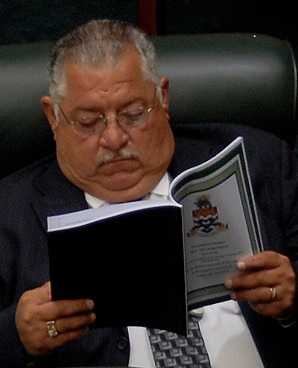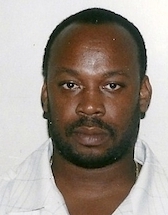Archive for June 18th, 2010

Have you seen this man?
 (CNS): Chad Anglin, aged 30, from the West Bay area (photo left) is wanted by police for questioning in connection with a violent assault on a woman in the early hours of Thursday morning (17 June). The RCIPS says the woman was rescued by two patrolling officers who approached the car in which the attack took place but she sustained bruising to her face and a cut to her throat. The police are calling on the public to assist in tracing Anglin and released a photograph of him Friday. According to the RCIPS, just before 2:00 am that morning two officers from the RCIPS Uniform Support Group were on patrol in Garvin Road, West Bay. They approached a parked vehicle and interrupted a savage attack which was taking place on a young woman in the car. The offender ran off into the bushes as the officers approached.
(CNS): Chad Anglin, aged 30, from the West Bay area (photo left) is wanted by police for questioning in connection with a violent assault on a woman in the early hours of Thursday morning (17 June). The RCIPS says the woman was rescued by two patrolling officers who approached the car in which the attack took place but she sustained bruising to her face and a cut to her throat. The police are calling on the public to assist in tracing Anglin and released a photograph of him Friday. According to the RCIPS, just before 2:00 am that morning two officers from the RCIPS Uniform Support Group were on patrol in Garvin Road, West Bay. They approached a parked vehicle and interrupted a savage attack which was taking place on a young woman in the car. The offender ran off into the bushes as the officers approached.
Detective Chief Inspector Peter Kennett said, “The victim had sustained bruising to her face and a cut to her throat. She was bleeding heavily. Officers immediately called for assistance from other officers while they rendered first aid. An extensive police operation followed but as yet no arrests have been made. The officers, by going about their normal patrolling duty, clearly prevented what could have been an even worse attack. It’s imperative that we locate Chad Anglin as soon as possible. If anyone knows where he is they should contact police immediately.
“We hope the release of this photograph today will alert the public to the fact that we need to trace this individual urgently – butit also underlines our commitment in the RCIPS to use every means available to apprehend those suspected of violent crime as quickly as possible.”
Anyone with any information about this crime or the whereabouts of Anglin should inform the police immediately. Calls can also be made to Crime Stoppers on 800-8477 (TIPS).
Spaghetti O’s with Meatballs recalled
(CNS): Foster’s Food Fair IGA has pulled “Campbell Spaghetti O’s with Meatballs” off their shelvesfollowing the voluntary recall of the product by Campbell Soup Supply Company, LLC. The proactive measure was taken, says Fosters, to ensure the safety and well-being of customers. Approximately 15,000,000 pounds of the canned product has been recalled due to possible under-processing, the US Department of Agriculture’s Food Safety and Inspection Service (FSIS) announced today. The problem was discovered through a routine warehouse inspection by the company and its subsequent investigation. FSIS has received no reports of illnesses from consumption of these products.
Fosters said consumers who have purchased this product should stop using it immediately, and until Foster’s Food Fair IGA has a further correspondence from the manufacture on this affected product, moving forward, it will not be available. “We are sorry for any inconvenience this may cause, however the safety of our customers is our top priority,” a release said and urged all customers who have purchased this product to return the affected product to their Foster’s Food Fair IGA of purchase for a full refund.
As more information is available from Food Safety Inspection on the affected Campbell Spaghetti O’s product and the circumstances of this recalled item, Foster’s Food Fair IGA will make the information available via further communication with the media.
Read more on the USDA website

Tibbetts says no to fuel duty
 (CNS): – Full story update-: Although the leader of the opposition said he was reluctant to vote no to the budget he told the Legislative Assembly on Friday that he could not support it while it contained the 25 cent rise in fuel duty. Kurt Tibbetts stated that the increase on a gallon of fuel would have a serious impact on everyone’s electricity bills and on the cost of living in general when business passed the increase on to customers. In his response to the premier’s budget presentation the opposition leader said he and his colleagues were relieved to see the three year plan, which they had advocated, even if it was vague, but criticized the budget statement for being short on detail and overly optimistic. (Photo Dennie Warren Jr)
(CNS): – Full story update-: Although the leader of the opposition said he was reluctant to vote no to the budget he told the Legislative Assembly on Friday that he could not support it while it contained the 25 cent rise in fuel duty. Kurt Tibbetts stated that the increase on a gallon of fuel would have a serious impact on everyone’s electricity bills and on the cost of living in general when business passed the increase on to customers. In his response to the premier’s budget presentation the opposition leader said he and his colleagues were relieved to see the three year plan, which they had advocated, even if it was vague, but criticized the budget statement for being short on detail and overly optimistic. (Photo Dennie Warren Jr)
Tibbetts said the opposition agreed with a lot of things the premier had said in his statement but had concerns over the statistics. The PPM leader warned that government’s previous predictions were woefully in accurate. He reminded the House that in October the government had brought a budget which not only balanced but was expected to deliver a surplus of $5 million dollars but which had turned out to be a deficit of $50 million.
Tibbetts spoke for less than two hours in his response to McKeeva Bush’s budget presentation delivered to the House on Tuesday, when he asked the government to drop the fuel increases. The PPM leader also asked the premier to roll back the heavy business and work permit fees imposed on the private sector in the last budget whic had undermined the volume of business. He also called for action on public sector and pointed out that in an 88 page address the premier had dedicated a mere three paragraphs to address one of the country’s major concerns – the increase in violent crime.
The real cost of the proposed private finance initiatives such as the cargo port on the community, the dangers of a rising cost of living and the lack of specifics were the opposition leader’s main criticism as he delivered his response to a budget presentation which he said was full of inconsistencies and which would burden the community without addressing the burning issues.
Talking about the need for more consultation and offering support to government to improve the country’s future fortunes together, the leader of the opposition told the premier that the fuel increase was a dangerous and inflationary measure which he should reconsider.Tibbetts reminded the premier that the UDP had championed the interests of the average man and woman during the election but almost immediately had lost its concern. Government had already re-imposed the 20 cent gallon duty on diesel fuel used by CUC which had been removed by the PPM administration.
Dive Pirates invade Cayman Brac
(CNS): A group of adaptive divers who make an annual week-long trip to Cayman Brac are returning tomorrow (Saturday 19 June), this time with a total of 83 people. The Dive Pirates, a non-profit organization based in Texas, gives people with disabilities and their dive buddies diving lessons and scuba gear, and then sponsors a vacation for them and their support teams at the Brac Reef Beach Resort. The DPF is funding nine new divers this year, including those who have suffered combat injuries, car accidents or illness, while six adaptive divers and their companions are self-funded.
The adaptive divers in this year’s group include 2 paraplegics, 5 quadriplegic, 4 amputees, one with partial paralysis, one closed head injury, one with burns and fused ankles, and one diver with an injured back. DPS says that this year the group will learn underwater photography with David Haas, enter various contests, and concoct “acts of piracy” during the week.
The Dive Pirates have been making annual trips to the Brac since 2004, bringing larger groups each year. The 2010 group of 83, which fills the resort to capacity, is the largest so far and the DPF may bring two groups next year, they say. The Brac Reef hotel, which was rebuilt after it was demolished in Hurricane Paloma, now has three rooms that are fully wheelchair accessible from the poolside, with all furniture, fixtures and fittings designed to accommodate wheelchairs, and boardwalks in the old property have been replaced with wheelchair-friendly concrete walkways. All dive staff at the resort’s dive operation, Reef Divers, are certified SSI Adaptive Specialty Instructors.
Last year, even though the resort was still in the construction process, the Dive Pirates made their annual trip, this time with 63 divers, 15 of whom were divers with disabilities. The group stayed at the new Alexander Hotel and at Breakers condominiums and dived with Reef Divers.
While the Brac Reef’s efforts to accommodate adaptive divers had been driven by their association with the Dive Pirates, Viers said they were also beginning to get other disabled guests who had heard of them through the DPF.

Bermuda-based KeyTech to acquire WestTel
 (The Royal Gazette): KeyTech Ltd. is set to acquire a 33 percent stake in Cayman-based WestTel Ltd. giving it complete control of the company, it was revealed yesterday. WestStar TV Ltd, the sister company of telecommunications provider WestTel Ltd. has agreed to transfer its remaining shares in the company to KeyTech, pending approval by the country’s Information, Communication and Technology Authority. KeyTech already owns 67 per cent of the shares in WestTel and following the completion of the transaction would hold all of the company’s shares. KeyTech plans to expand WestTel’s fibre-optic cable network in Cayman.
(The Royal Gazette): KeyTech Ltd. is set to acquire a 33 percent stake in Cayman-based WestTel Ltd. giving it complete control of the company, it was revealed yesterday. WestStar TV Ltd, the sister company of telecommunications provider WestTel Ltd. has agreed to transfer its remaining shares in the company to KeyTech, pending approval by the country’s Information, Communication and Technology Authority. KeyTech already owns 67 per cent of the shares in WestTel and following the completion of the transaction would hold all of the company’s shares. KeyTech plans to expand WestTel’s fibre-optic cable network in Cayman.
A general commercial notice posted in the Cayman Islands gazette in May noted: "As part of this application, WestTel also requested an amendment to…its ICT licence in order to delete the requirement that at least 25 per cent of its equity be held by Caymanians."

Opposition leader to respond to budget
(CNS): The debate on the premier’s budget presentation, his first as minister of finance, opens this morning with the opposition’s response. The leader of the PPM, Kurt Tibbetts, will be the first member of the House to comment on McKeeva Bush’s over three hour budget speech presented to the Legislative Assembly on Tuesday. Tibbetts is likely to question the reliability of government’s earnings forecast given the recent prediction inaccuracies. Not only did the PPM face a massive shortfall after predictions from the Financial Secretary’s Office proved inaccurate in 08/09, in the last budget in October the UDP had predicted a $5million plus surplus for the end of this financial year, which will now be close to a $50million deficit. (Photo Dennie Warren Jr)

Big Mac’s little gamble
It may go down as McKeeva Bush’s slickest political maneuver yet. He is artfully allowing a referendum to decide whether or not Cayman will legalize gambling. If all goes according to plan and the people vote the way he hopes, West Bay’s smooth operator can still play the pious churchman while finally getting that casino he’s been salivating for all these years.
“It’s the will of the people,” he will say. “I am simply respecting the democratic process. My hands are clean. Now let’s play some Black Jack!”
What is this whole gambling-government connection anyway? Put simply, it’s a creative way to tax mathematically challenged citizens as well as those who are prone to unrealistic fantasies. The worse you measure up on those two scales, the more money you are likely to gamble away. To some people, however, gambling is far more sinister than simply a way of squeezing money out of the rubes.
The Cayman Ministers Association (CMA) has stormed to the front of this issue. Armed with “research” (cut and pasted from Wikipedia, no doubt), they are making the case that a national lottery and a casino will increase crime and pretty much lead to every other Caymanian selling their children for one more turn at the craps table. I know that the CMA folks speak to God every night but I think they are wrong about this, nonetheless. Gambling does not necessarily lead to social decay. It can, of course, but so too can incompetent politicians and we certainly don’t seem to have any problem accepting them in Cayman, now do we?
The CMA’s claim that legalized gambling will lead us to runaway crime is difficult to take seriously because we’re already there. Serious crime is here; it didn’t wait on the grand opening of our first casino. Just this month, for example, we had a streak of daily armed robberies striking nearly every gas station in Grand Cayman. What, if gambling is legalized we will have two gas stations robbed per day rather than just one per day? Our murders-to-population ratio is already close to or ahead of Detroit and Kingston. Are a few slot machines really going to make it any worse? Maybe, but I doubt it.
Could some Caymanians throw away their lives gambling? Sure, but very few would. It’s a minor issue that might impact a tiny handful of people at most. Most Caymanians are not total morons with no understanding of near impossible odds. Virtually everyone here who chooses to gamble would still keep enough cash in their pocket to buy baby food on the way home. If the preachers are so terrified of Caymanians being hypnotised by roulette-wheels then they should devote their energies to making sure our schools do a better job of teaching mathematics. Anyone who has taken a basic statistics course, for example, would find it nearly impossible to place extravagant bets on the long-shot games casinos offer. Generally, only the very wealthy and the very stupid spend large sums of money gambling. It would be no different in Cayman.
By the way, morality and crime aside, would a Cayman Islands lottery even be profitable here? Has anyone crunched the numbers? Cayman is not Florida with a population of 18 million. We only have about 50,000 people. How many out of that will buy lottery tickets every week? How many will they buy? Assuming tickets would be $1, it’s difficult to see where the money will come from for big prizes. If we are talking about nothing more than a $50,000 or so payoff, I can’t see much excitement being generated. It would feel like just another Rotary Club raffle. No big deal. Maybe tourists would buy large numbers of tickets, but that’s far from certain.
There is also the cost of printing the tickets, distribution and sales, advertising, salaries for managers and bean-counters and, don’t forget, security guards to prevent winners from being shot by a criminal when they show up at the lottery office with their winning tickets. Considering all that, our government could end up losing money.
Speaking on a radio talk show, CMA’s anti-gambling point man Reverend Nicholas Sykes described gambling as a dishonest means of making money. He’s right; gambling is a scam. It’s taking money from people while promising them the chance of a very unlikely payoff. Like Sykes says, gambling is immoral. It’s almost as bad as taking money from people while promising them the chance of a big payoff in the sky after they die.
Ironically, in the end, I must agree with the Cayman Ministers Association. I say vote “No” because gambling would be a disaster for the Cayman Islands. Why do I think this? Not because gambling is inherently evil or because it will make all of us start beating our children and smoking crack. The only reason I’m against legalized gambling in Cayman is because Caymanian politicians would control it. That alone pretty much guarantees that it would turn sour fast. Gambling revenue could be a fine addition to our economy, no doubt. But given the quality of the people we keep electing to run things, it surely wouldn’t work out like we might hope.
First of all, more money in the hands of our politicians—UDP or PPM, it doesn’t matter—would not be used to pay off debt or actually improve education or anything else that matters. Have no doubt, the budget would be shuffled around so that our politicians had more to spend on tourist “attractions” that nobody goes to and other mysterious black holes that always seem to emerge in Cayman. They would spend away new wealth on pay raises and pay offs. And if some crime or social problems did bubble up directly due to gambling, they would ignore it or be so slow to react that the entire country really could end up being dragged to hell—just like the preachers are warning.
So, the bottom line is thatgambling may be stupid but it’s not evil. It would not condemn us to certain and absolute destruction. However, given the realities of Cayman politics, the safe vote is a definite “No”. We aren’t ready for the additional responsibility.

Reward posted for arrest of ‘Dudus’
 (Jamaica Observer): The police have placed a US$20,000 bounty on the head of fugitive Christopher ‘Dudus’ Coke, who is wanted in the United States to answer charges related to drugs and gun-running, the Jamaican police have said. The reward is the latest effort on the part of the police and the Jamaica Defence Force to capture Coke, 42, who fled his West Kingston community base of Tivoli Gardens on May 24 when law enforcers moved in to capture him. "The police would like to find Coke to execute a warrant of arrest issued by the Courts of Jamaica for him to face extradition proceedings," read the statement from the constabulary’s director of the communication Karl Angell.
(Jamaica Observer): The police have placed a US$20,000 bounty on the head of fugitive Christopher ‘Dudus’ Coke, who is wanted in the United States to answer charges related to drugs and gun-running, the Jamaican police have said. The reward is the latest effort on the part of the police and the Jamaica Defence Force to capture Coke, 42, who fled his West Kingston community base of Tivoli Gardens on May 24 when law enforcers moved in to capture him. "The police would like to find Coke to execute a warrant of arrest issued by the Courts of Jamaica for him to face extradition proceedings," read the statement from the constabulary’s director of the communication Karl Angell.
The statement also called on persons who knew where Coke was hiding to contact Operation Kingfish at 811, Crime Stop at 311 and Police Control at 119 with the relevant information.
The arrest warrant was issued a month ago, but Coke has been successful in eluding a tight dragnet set up by the security forces, although those close to him, including his brother Leighton ‘Livity’ Coke, sister Sandra ‘Sandie’ Coke, along with business partner and confidante Justin O’Gilvie have all turned themselves in, something that several prominent Jamaicans have appealed to the fugitive to do.
Cayman’s coral in crisis
(CNS): Following a major bleaching event in local waters during 2009, corals around the Cayman Islands have since fallen victim to disease, which is now advancing through some of the oldest types of coral. Andy Bruckner, a well respected coral reef scientist who has done considerable work on coral disease, has been in Cayman for the last few weeks examining the situation and to hold disease workshops to assist the Department of Environment and others working in research and management. The goal is to find out more about what he called the “white plague”, the disease that is destroying the coral, and find ways to contain its progress and slow down the damage which is already quite significant.
Mixed signals on environment
(CNS): As government continues with the consultation on the proposed national conservation law, the recent message it is sending on its policy for the environment is mixed. While on the one hand government says it intends to pass the law, improve public transport and promote environmental awareness in tourism and development, on the other it says it intends to go ahead with the North Sound channel and a commercial cargo port, suggesting the natural environment is still under threat. Premier McKeeva Bush has confirmed that a private sector plan to develop a cargo facility in East End is going to Cabinet for discussion and that he is seeking investors for the channel project to attract yachts to the country.
Bush told the Legislative Assembly on Tuesday, “A channel for the North Sound is an absolute necessity if the country is going to ever get business from the mega yacht industry. Bearing this in mind, government will be seeking investors to do a necessary channel. Public discussion will take place, environmental impact adhered to so that any agreed work can keep damage to the minimum.”
The long waited National Conservation Law that could ensure the protection of the country’s natural resources in the face of this kind of development, which has already gone through extensive consultation and revision, is currently being reviewed again. There is hope, however, that this latest round of consultation could see the law back on track.